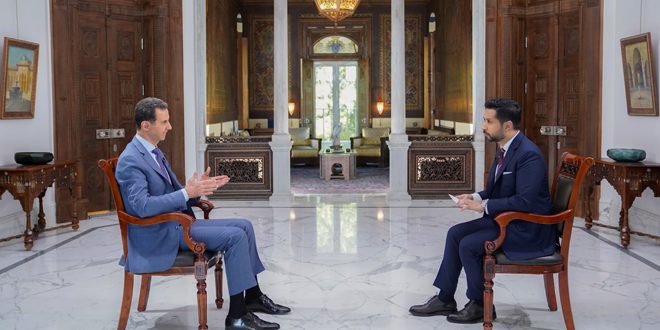In a recent interview with Sky News Arabia, President Bashar al-Assad placed blame for the widespread destruction in Syria squarely on those who supported terrorism and plotted for war. He emphasized that it is these actors who should bear the responsibility for the devastation that has swept through the country, rather than those who took up arms against terrorism.
President al-Assad acknowledged that nearly half a million refugees had returned to Syria in recent years. However, he raised a poignant question: How could refugees rebuild their lives without access to fundamental necessities such as water, electricity, schools, and medical care? He asserted that these basic elements of existence were prerequisites for any meaningful return of refugees.
The Syrian leader also addressed the theoretical possibility of averting the war. He stated that while it might have been conceivable to avoid conflict by acquiescing to the demands imposed on Syria, this course of action would have come at an exorbitant cost in terms of surrendering Syrian rights and interests. President al-Assad underscored his commitment to defending his nation’s sovereignty and interests.
Assad to Sky News: No Meeting with Erdogan, My Son Hafez Outside Politics
Reflecting on the magnitude of the destruction caused by terrorism, President al-Assad admitted that the extent of the devastation was unforeseen. He explained that although Syria was aware of impending threats and plots, the intricate details of the orchestrated destruction were beyond anticipation.
“Even in the direst circumstances, no state, no matter its nature, intentionally destroys its own homeland. Terrorism was the destructive force here,” President al-Assad stressed. He maintained that the state’s constitutional duty was to protect the nation against external threats.
Regarding the impact of friendly nations on Syria’s resilience, President al-Assad acknowledged their crucial support but emphasized that ultimate steadfastness lay within the heart of the Syrian people.
Responding to questions about Syria’s potential return to the Arab League and the status of inter-Arab relations, President al-Assad emphasized the need for substantial changes in the nature of these relationships. He indicated that a return to formal diplomatic ties would be contingent upon tangible progress in addressing the core issues affecting Arab unity.
The topic of refugees remained central to the discussion. President al-Assad pointed out that while hundreds of thousands of refugees had returned to Syria in recent times, the momentum had waned due to the dire living conditions in the country. He reiterated that the absence of basic amenities like water, electricity, education, and healthcare was a deterrent to successful repatriation.
Addressing drug trafficking concerns, President al-Assad dismissed claims that Syria actively encouraged such activities. He argued that if the state were promoting drug trafficking, it would be tantamount to inviting terrorism, as the outcomes were similarly destructive. He placed responsibility on external forces that contributed to Syria’s destabilization.
President al-Assad acknowledged that the “Caesar Act” posed challenges to the country’s economic recovery, primarily due to the destruction of infrastructure by terrorists and the war’s indelible impact on Syria’s image as an investment destination.
In addressing expectations from the Arab side, President al-Assad expressed hope for the development of stronger institutions and relations grounded in a foundation of mutual respect.
Commenting on the term “opposition,” President al-Assad emphasized the importance of locally-rooted opposition that possessed a genuine national agenda and public support.
Regarding Israeli aggression, President al-Assad asserted that the Syrian army remained a primary target, often under the guise of Iranian presence. He indicated that these attacks persisted as long as Israel maintained its adversarial stance and Syria thwarted terrorist plans.
When questioned about a potential meeting with Turkish President Erdogan, President al-Assad emphasized the necessity of a clear goal and agenda for such a dialogue. He highlighted the divergence in objectives between the two leaders, making it difficult to reach common ground and suggesting that a meeting under Erdogan’s terms was unlikely.
This article was edited by The Syrian Observer. The Syrian Observer has not verified the content of this story. Responsibility for the information and views set out in this article lies entirely with the author.


